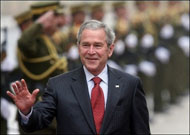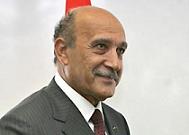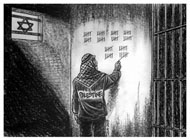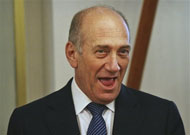At the moment, US President George W. Bush is completing the second stage of his tour of the Middle East. The purpose of his trip to Palestine, Israel, Kuwait, Bahrain, UAE, Saudi Arabia and Egypt is to rally support behind the Israeli/Palestinian peace process and to address the pressing issue of Iran’s increasing regional influence. While he has been warmly welcomed by his oil-rich allies in the Gulf, did he successfully execute the first stage of his journey, his first to the Holy Land as president, which aimed at making a significant impact by providing the necessary “nudge” to push the peace process along?
It is important to mention first that the president’s visit was positive in some respects. The arrival of the head of state for the world’s only superpower to the West Bank for only the second time is a step forward. In addition, a US President advocating the establishment of an independent and sovereign Palestinian state also cannot be overlooked. President Bush also delivered some promising rhetoric which could imply that he intends to start applying serious pressure, such as referring to the situation since 1967 as “occupation” – a word he very rarely uses. Furthermore, the presence of President Bush could prove very beneficial to Israeli Prime Minister Ehud Olmert. Both showed no hesitation in announcing the extent of their close friendship, especially Olmert who showered the president with a host of compliments and praise. This relationship could crucially act as a counterweight for Olmert who currently balances on a tightrope of authority with the ongoing Winograd report and his alleged illegal dealings, surrounded by influential ministers threatening to resign if peace meetings with the Palestinians continue. If individuals within the coalition, such as Avigdor Lieberman, abandon the prime minister now, Olmert and his party will invariably collapse, plunging the peace process into further delay.
However, this could all be deemed void if President Bush is not fully committed to peace, evidence of which can be detected when analyzing the effect his trip has had on the process. Suffice it to say, the US President has not clarified the issue and the framework of his modus operandi before the end of his term, but has instead left behind him a stagnant cloud of further confusion. The onus has fallen upon the Palestinians who are left on the sidelines as the third wheel in this union.
The President’s brief stay didn’t exactly create an atmosphere of hope among the people on either side. Thousands of hard-line Israelis formed a human chain around the Old City of Jerusalem emphasizing that Olmert does not represent the opinions of all Israelis. In addition, a poll by the Israeli newspaper Yedioth Ahronoth, barely 12 hours after the US President had landed, reported that 77% of Israelis do not believe that his visit will advance negotiations with the Palestinians.
As one would guess, the lack of confidence in the President was not limited to Israelis. 20,000 Hamas-affiliated demonstrators took to the streets in Gaza voicing their stiff opposition to Bush. Their cries of discontent were epitomized by the deposed Prime Minister of Hamas, Ismail Haniyeh, who declared that Bush showed bias to Israel and solidified its occupation while offering the Palestinians more illusions. Meanwhile, on the day Bush arrived in Ramallah, hundreds of protesters, undeterred by the curfew, paraded round the center of the city expressing their reservations. The locals in Ramallah answered in such a blasé fashion, simply responding that “Bush won’t help us”, an example of how skeptical Palestinians have become over the years concerning US involvement in the process.
There are a plethora of instances within Bush’s comments that fuel this degree of concern and deep pessimism amongst Palestinians. In his first statement, after disembarking from Air Force One, President Bush accentuated that Israel’s security is a major priority, later stating that “security is fundamental. No agreement and no Palestinian state will be born of terror. I reaffirm America’s steadfast commitment to Israel’s security”. Moreover, although the World Bank has stressed the dire economic effects of checkpoints on the West Bank, Bush understood that they were a “necessary evil” that ensure Israeli security. By saying this, Bush in effect, presented Israel with an excuse not to act on their stipulation of the roadmap, freezing settlement construction and removing illegal outposts, until the Palestinians have completed the unenviable task of “confronting terrorists and dismantling terrorist infrastructure”. The PA, therefore, must be the first to deliver in this quid pro quo strategy and while they go about implementing this obligation [which they have successfully begun] Israel will continue to stall on the settlement question.
While on the topic of settlements, Bush declared that “the agreement was, get rid of all outposts, illegal outposts, and they ought to go”. Even Olmert has said that it is “disgraceful” how they haven’t removed illegal outposts from the West Bank in the four years since the roadmap was signed. However, removing outposts is different from freezing settlements. There are over 100 outposts in the West Bank but around 450,000 Israelis and rising, live in settlements in the West Bank and east Jerusalem. Bush clearly highlighted that construction on these settlements must be frozen. Olmert may view east Jerusalem as a separate entity but there was no discussion on the thousands of permits that have been issued by the Israeli government to expand settlements in the West Bank. As a senior Israeli official explained recently, "it is very clear that we are committed not to build new settlements…but it is well understood that there are some areas, where some activity will continue".
The next puzzling point in Bush’s rhetoric was his apparent confusion over the relationship between Hamas and the PA as well as his contradiction regarding his timeframe for peace. Bush seemed to be under the impression that President Abbas had control over the activist groups that launch Qassam rockets daily into Israel from Gaza. “To the rockets, my first question is going to be to President Abbas, what do you intend to do about them”. Bush evidently fails to realize that since Hamas seized Gaza in June, the PA has had no authority there. Coincidently, it is even difficult for Hamas to stop political activist groups, such as Islamic Jihad, from firing rockets from Gaza. One possible method of solving the Gaza issue is for dialogue to ensue between Hamas and the PA. Having said this, Israel has adamantly refused, claiming that if that happened, Israel would be urged to cease peace talks.
In his press conference with President Abbas in Ramallah, while proclaiming throughout his trip that “there will be a signed peace treaty by the time I leave office [end of 2008]”, the President also acknowledged that "Gaza is a tough situation. I don't know whether you can solve it in a year or not". A senior US official even described to AFP how no agreement is going to work if Hamas continues to control Gaza. Despite the importance of Gaza to the peace process, it was not discussed.
With respect to the nature of Bush’s itinerary for the second stage of his trip, one cannot also help but question the president’s real intentions. Bush has been far from discreet in informing the international community of the threat Iran poses to global security. Israeli President Shimon Peres alluded to the danger of Iran in his opening statement at Ben Gurion Airport and the topic of Iran featured heavily during the press conference in Jerusalem. Following the US Military Intelligence report explaining how Iran stopped its nuclear program in 2003 following the Iraq War, was the meeting with Olmert focused more on allaying Israeli fears of isolation from the US? Not to mention, Bush reserved time to track the footsteps of his “favorite philosopher”, traveling to the birthplace of Jesus in Bethlehem and to Galilee where Jesus delivered his Sermon on the Mount. This, along with his visit to Yad Vashem, was the only “historic moment” Bush’s trip entailed. Popular opinion in Palestine accuses Bush of occupying himself more with his pilgrimage than speaking on the peace process. On these two counts, it is not surprising if the Palestinians feel as if their interests have been treated as inferior to the president’s personal agenda.
The antitheses in Bush’s comments are obvious when one hears his elementary and vague summation of his vision for the future.
"There should be an end to the occupation that began in 1967. The agreement must establish Palestine as a homeland for the Palestinian people, just as Israel is a homeland for the Jewish people. These negotiations must ensure that Israel has secure, recognized, and defensible borders. And they must ensure that the state of Palestine is viable, contiguous, sovereign, and independent."
“An end to occupation that began in 1967” surely includes east Jerusalem? Does President Bush imply that the homeland for the Jewish people will be a Jewish state? Mr. Bush asserts that Palestine be a “contiguous” state and also announced that it must not resemble “Swiss cheese”. Will not the pockets of settlements, which he recommended remain, in his letter to Sharon in 2004, resemble “Swiss cheese”? What about right of return for Palestinian refugees? Bush agreed that they be given monetary compensation but neglected to give an explanation as to where they will establish their new homes, having been denied the right to return to their old ones.
Although the president venturing into the West Bank and proclaiming an independent state of Palestine are welcome advancements, his presence did not seem to pressure or inspire any side into a sense of urgency. It is one thing to stand on a podium and endorse a two state solution, it is quite another to feasibly validate one. However, as the president said to Prime Minister Olmert, the US cannot “dictate terms” of a future solution but “we’ll help, and we want to help. If it looks like there needs to be a little pressure, Mr. Prime Minister, you know me well enough to know I’ll be more than willing to provide it”.
As for the respective players, Israel was assured America’s immediate commitment to their security while the Palestinians were promised a final agreement by the end of the year. One can envisage which one of these promises is going to be easier to implement and uphold. Furthermore, the same question still lingers elusively awaiting an answer. What measures is Bush going to employ to guarantee that his vision of the roadmap is achieved? His definition of pressure doesn’t appear to have been effective while no other methods were proposed.
While in the Holy Land, President Bush appointed Lt. Gen William Frasier as the intermediary to oversee that the two parties abide by the obligations of the roadmap. The president also accepted an invitation by Israel to celebrate its 60th anniversary in May. When he returns and attends this occasion, one hopes that he also recognizes the remembrance of “Nakba” which occurred as the direct result of the formation of the state of Israel. By then, Bush will only have seven months before the end of his term so it is imperative that he adapts his role and prepares to enforce more pressure than he did this time around.











